人教版(2019)必修第一册Unit 1 Teenage Life Opening page & Listening and Speaking 课件(共28张PPT)
文档属性
| 名称 | 人教版(2019)必修第一册Unit 1 Teenage Life Opening page & Listening and Speaking 课件(共28张PPT) | 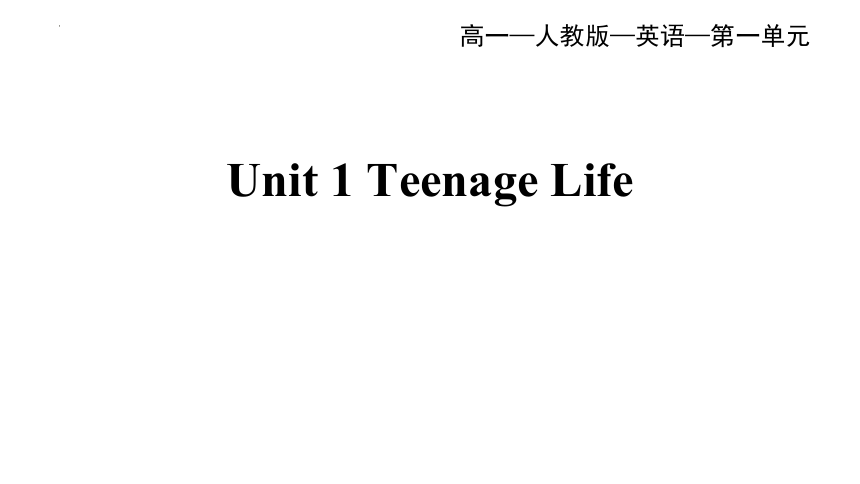 | |
| 格式 | pptx | ||
| 文件大小 | 3.9MB | ||
| 资源类型 | 教案 | ||
| 版本资源 | 人教版(2019) | ||
| 科目 | 英语 | ||
| 更新时间 | 2024-04-14 14:58:17 | ||
图片预览

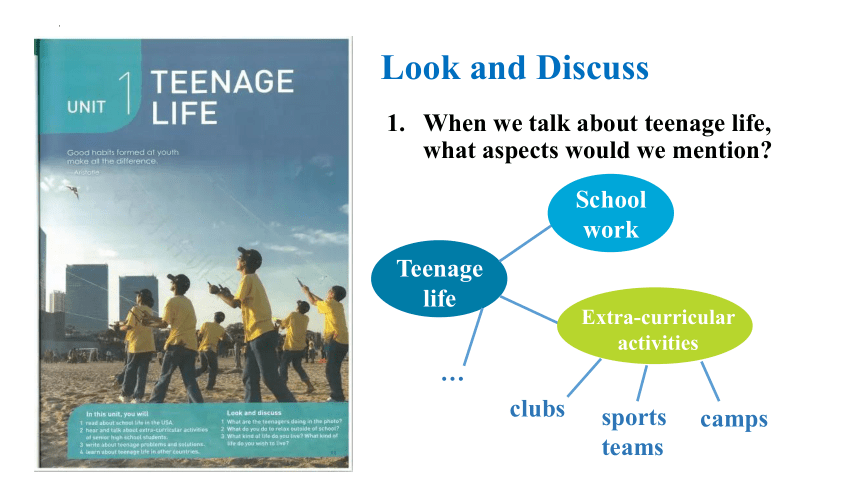
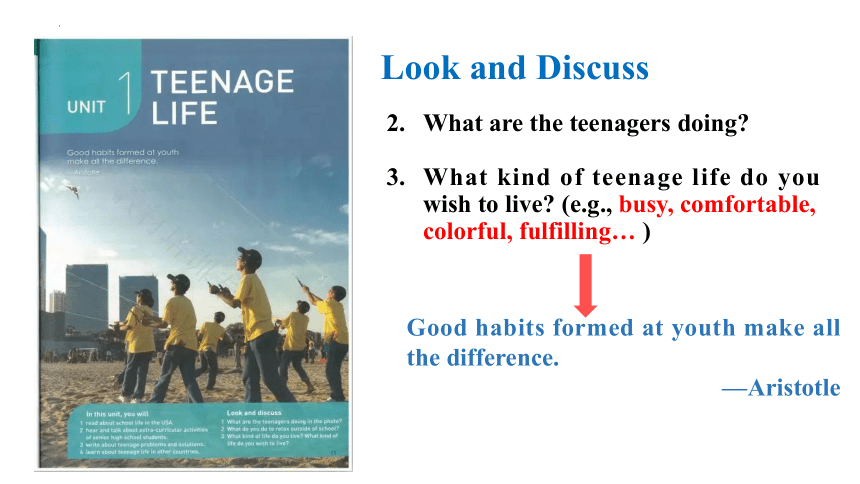
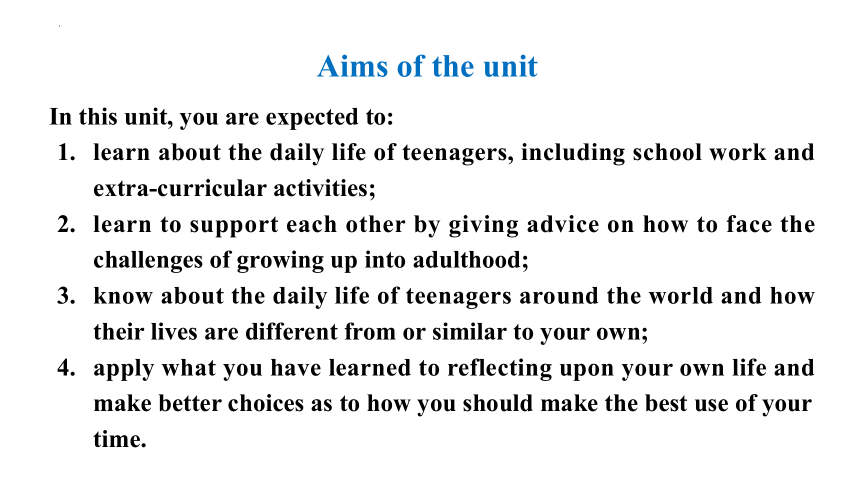
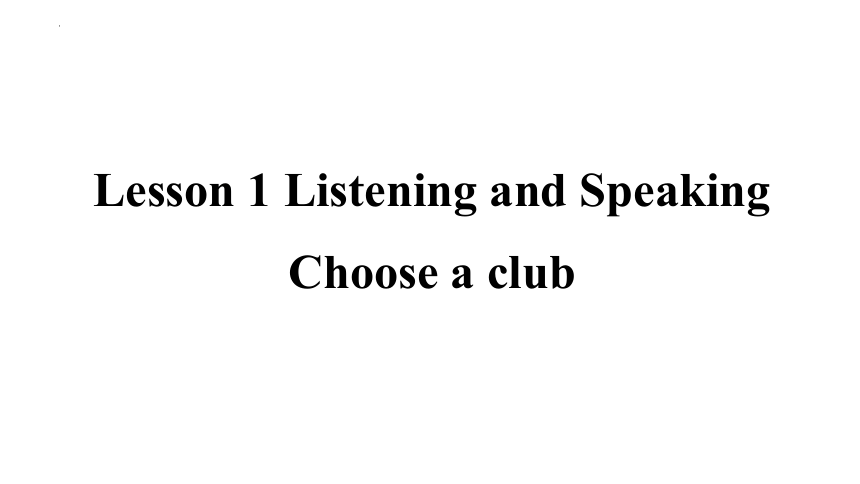
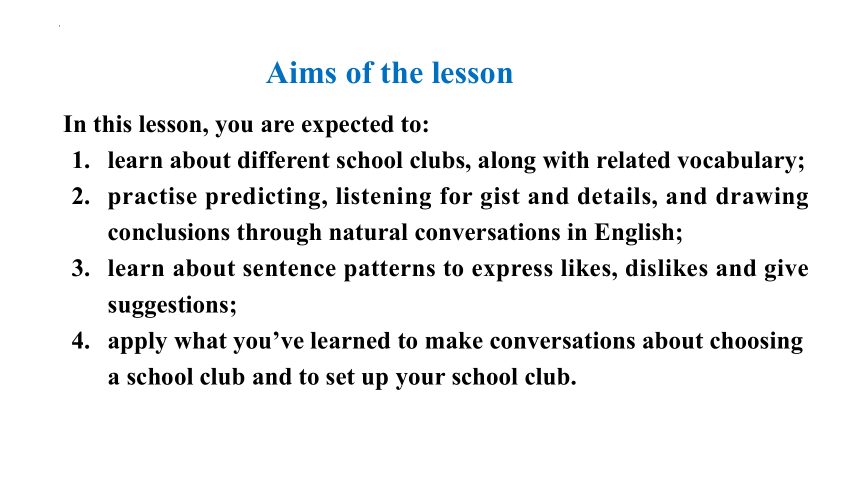
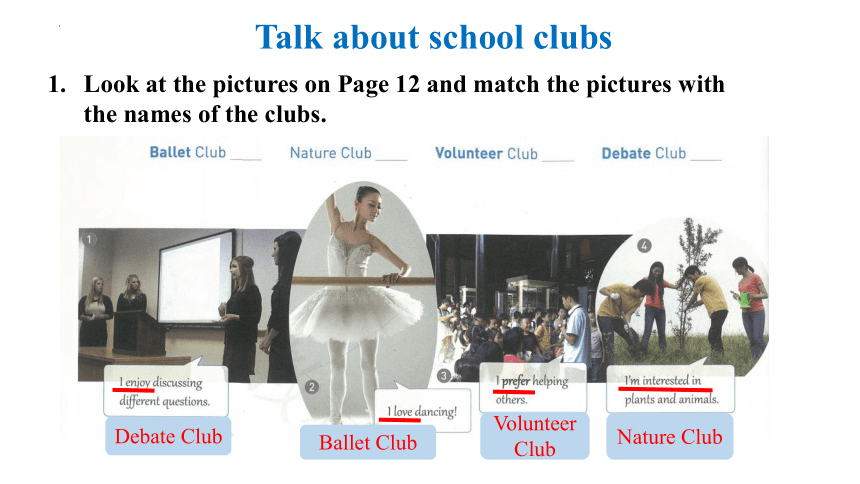
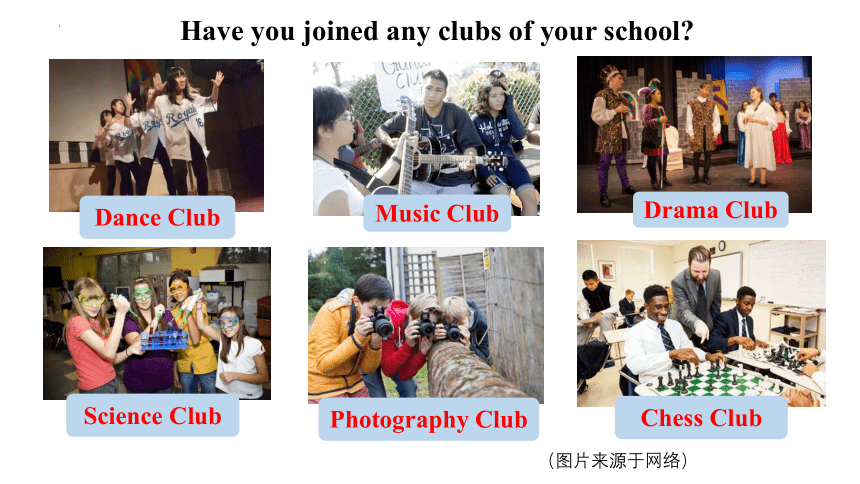
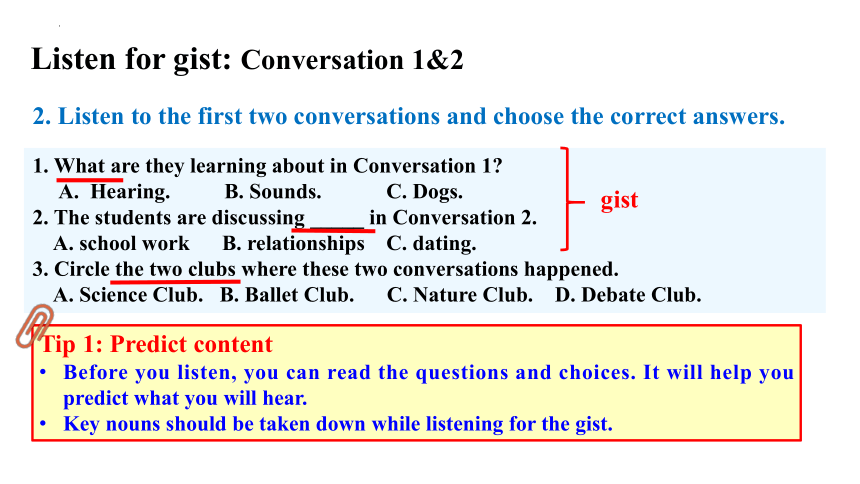
文档简介
(共28张PPT)
高一—人教版—英语—第一单元
Unit 1 Teenage Life
When we talk about teenage life, what aspects would we mention
Look and Discuss
Teenage life
School work
Extra-curricular activities
clubs
sports teams
camps
…
What are the teenagers doing
What kind of teenage life do you wish to live (e.g., busy, comfortable, colorful, fulfilling… )
Good habits formed at youth make all the difference.
—Aristotle
Look and Discuss
In this unit, you are expected to:
learn about the daily life of teenagers, including school work and extra-curricular activities;
learn to support each other by giving advice on how to face the challenges of growing up into adulthood;
know about the daily life of teenagers around the world and how their lives are different from or similar to your own;
apply what you have learned to reflecting upon your own life and make better choices as to how you should make the best use of your time.
Aims of the unit
Lesson 1 Listening and Speaking
Choose a club
In this lesson, you are expected to:
learn about different school clubs, along with related vocabulary;
practise predicting, listening for gist and details, and drawing conclusions through natural conversations in English;
learn about sentence patterns to express likes, dislikes and give suggestions;
apply what you’ve learned to make conversations about choosing a school club and to set up your school club.
Aims of the lesson
Look at the pictures on Page 12 and match the pictures with the names of the clubs.
Talk about school clubs
Debate Club
Ballet Club
Volunteer Club
Nature Club
Have you joined any clubs of your school
Music Club
Drama Club
Dance Club
Science Club
Photography Club
Chess Club
(图片来源于网络)
1. What are they learning about in Conversation 1
A. Hearing. B. Sounds. C. Dogs.
2. The students are discussing _____ in Conversation 2.
A. school work B. relationships C. dating.
3. Circle the two clubs where these two conversations happened.
A. Science Club. B. Ballet Club. C. Nature Club. D. Debate Club.
2. Listen to the first two conversations and choose the correct answers.
Listen for gist: Conversation 1&2
Tip 1: Predict content
Before you listen, you can read the questions and choices. It will help you predict what you will hear.
Key nouns should be taken down while listening for the gist.
gist
1. What are they learning about in Conversation 1
A. Hearing. B. Sounds. C. Dogs.
2. The students are discussing _____ in Conversation 2.
A. school work B. relationships C. dating
Listen for gist: Conversation 1 & 2
2. Listen to the first two conversations and choose the correct answers.
Teacher: Shh! Listen carefully!
[3-second beep at about 40 khz]
Teacher: Did you hear that No How about this
[3-second beep at about 17.4 khz]
Teacher: If you couldn’t hear the first one, it means you’re not a dog! [Laugh.]
Dogs can hear very high frequency sounds, but people can’t. And if you
could hear the second one, you’re younger than 25.
Student: Wow! Why is that
Teacher: Our ears change when we get older. Children and young people can hear
the second one, but most people older than 25 can’t.
Audio script for Conversation 1
Teacher: Today’s topic is “Should teenagers date ” Team A, please begin.
Team A: We say no, they shouldn’t. One reason is that teenagers are too young.
They should think about schoolwork and spend more time studying.
Team B: We don’t agree with Team A. Our answer is “Yes”. Teenagers can date
if they want. It is quite natural for a teenager at that age to feel he or she
likes somebody. We think it’s possible for teenagers to date and study at
the same time.
Teacher: Team A
Audio script for Conversation 2
Tip 2: Key words about the gist are usually repeated most often.
3. Circle the two clubs where these two conversations happened.
A. Science Club. B. Ballet Club. C. Nature Club. D. Debate Club.
Tip 3: Conclusions sometimes can be drawn based on
our common knowledge or experience.
Teacher: Today’s topic is “Should teenagers date ” Team A, please begin.
Team A: We say no, they shouldn’t. One reason is that teenagers are too young.
They should think about schoolwork and spend more time studying.
Team B: We don’t agree with Team A. Our answer is “Yes”. Teenagers can date
if they want. It is quite natural for a teenager at that age to feel he or she
likes somebody. We think it’s possible for teenagers to date and study at
the same time.
Teacher: Team A
Sentence patterns used to express opinions:
We / They / You should (not) …
We (don’t) think / agree with …
Sentence patterns used to state reasons:
One reason is that … Another one is that…
3. Listen to conversation 3. Then help Adam choose a club.
1. Tick the activities that happen in each club.
2. Adam says that he likes __________ but is not so interested in ________.
3. Which club do you think is suitable for Adam Why
Listen for details: Conversation 3
what → v. + n.
what → n. (likes & dislikes)
what → club names / n.
why → reasons or conclusions
2. Adam says that he likes __________ but is not so interested in ________.
3. Which club do you think is suitable for Adam Why
I think Adam should join the _______________ because he says that
he _________________________________.
animals
plants
Volunteer Club
would like to do something outdoors
Listen for details: Conversation 3
3. Listen to conversation 3. Then help Adam choose a club.
1. Tick the activities that happen in each club.
Julie: Hi, Adam! Are you going to join a club
Adam: Hi Julie! I’d like to, but I’m not sure which one.
Julie: I think I will join the Ballet Club. It’s always been my dream to be a dancer,
and ballet has such beautiful movements.
Adam: Oh, wow, dancing’s not for me—I’ve got two left feet! Mr Brown told me
about the Nature Club. They watch biology lectures and grow plants in a
greenhouse. I like animals, but I’m not so interested in plants.
Julie: Did you hear about the Cartoon Club
Adam: Yes, I love cartoons! But what do they do in the club Watch cartoons
Julie: No, they write stories and draw cartoons.
Adam: Oh, no I’m not good at drawing. Besides, I’d like to do something outdoors.
Julie: Max is in the Volunteer Club. He says that they mostly help clean up parks
and give directions to visitors. Why not talk to him
Audio script for Conversation 3
Tip 3: It’s important that we focus on content words
(v., n., adj., adv., numbers and names) while listening.
Julie: Hi, Adam! Are you going to join a club
Adam: Hi Julie! __________, but I’m not sure which one.
Julie: I think I will join the Ballet Club. __________________________ be a dancer,
and ballet has such beautiful movements.
Adam: Oh, wow, ____________________—I’ve got two left feet! Mr Brown told me
about the Nature Club. They watch biology lectures and grow plants in a
greenhouse. _____________ , but ____________________________.
Julie: Did you hear about the Cartoon Club
Adam: Yes, ______________! But what do they do in the club Watch cartoons
Julie: No, they write stories and draw cartoons.
Adam: Oh, no ______________________. Besides, _____________________________.
Julie: Max is in the Volunteer Club. He says that they mostly help clean up parks
and give directions to visitors. ____________________
Listen to conversation 3 again and fill in the blanks.
I’d like to
It’s always been my dream to
dancing’s not for me
I like animals
I’m not so interested in plants
I love cartoons
I’m not good at drawing
I’d like to do something outdoors
Why not talk to him
Like Dislike Suggestion
Sentence patterns to express likes, dislikes and give suggestions
I like/love/enjoy/prefer …
I’m interested in …
I’m into …
I’m fond of …
I’m crazy about …
It’s always been my dream to be a …
…
I don’t like …
I hate …
I have mixed feelings about …
… is not for me.
I’m not so interested in …
…
Why not …
You can try …
I think you should …
Maybe you could …
I suggest that you (should) …
…
Choose a suitable school club
What do you think you should consider when choosing a school club How can you choose a suitable school club
We can choose a suitable school club based on:
our interests
our needs
our future plans
…
Choose a school club (P13)
Suggestions:
Why not …/ How about …
I think you could …/ You can try …
Talk in pairs to help each other choose a school club.
Enquiry:
Are you going to join …
Which club would you like to join
Have you decided which club to join
I’m wondering which one I should choose ...
Likes / Dislikes:
I like/ enjoy/ prefer …;
I like ... better.
I am interested in / fond of / crazy about …
I love …, but I don’t like/ dislike …
If you ask me, I think ...
Present and assess your work
Items Assessment aspects Self-assessment Peer-assessment
Content Cover all the points (enquiry, like/dislike, suggestion).
Use details or reasons in the conversation.
Language Use at least three of the sentence patterns and appropriate words and expressions.
Logic Organize the conversation logically with suitable connectors.
Speaking Speak fluently with the right tone.
Yue: Hi, Lee! I’ve joined the Debate Club!
Lee: Excellent choice! It’s good for you.
Yue: What about you Have you decided which club to join yet
Lee: Well, I’ve got a lot on my mind. I was thinking about basketball or
perhaps the music club.
Yue: It’s up to you. Which one do you prefer
Lee: If you ask me I’m crazy about playing the piano. But I think
I’m more fond of basketball.
Yue: Obviously you are in hesitation. I suggest that you should join
the basketball club as basketball always seems to be your favorite.
An example of choosing a school club
Brainstorming & Speaking:
Work in groups to create a club you think others would be interested in joining.
Brainstorm in groups and finish Activity 2 on P21.
Prepare an oral introduction to your club. (Activity 4 on P21)
Set up a school club
Decide on the following details of your school club (P21)
In this lesson, we have:
learned about different school clubs and their activities;
practised predicting, listening for gist and details, and drawing conclusions through natural conversations in English;
learned about sentence patterns to express likes, dislikes and give suggestions;
applied what we’ve learned to make conversations about choosing a school club.
Summary
Homework:
Finish Activity 2 on P21.
Get familiar with the new words and expressions and finish Ex.1-4 on P71-72.
Preview “Reading and Thinking” on P14.
高一—人教版—英语—第一单元
Unit 1 Teenage Life
When we talk about teenage life, what aspects would we mention
Look and Discuss
Teenage life
School work
Extra-curricular activities
clubs
sports teams
camps
…
What are the teenagers doing
What kind of teenage life do you wish to live (e.g., busy, comfortable, colorful, fulfilling… )
Good habits formed at youth make all the difference.
—Aristotle
Look and Discuss
In this unit, you are expected to:
learn about the daily life of teenagers, including school work and extra-curricular activities;
learn to support each other by giving advice on how to face the challenges of growing up into adulthood;
know about the daily life of teenagers around the world and how their lives are different from or similar to your own;
apply what you have learned to reflecting upon your own life and make better choices as to how you should make the best use of your time.
Aims of the unit
Lesson 1 Listening and Speaking
Choose a club
In this lesson, you are expected to:
learn about different school clubs, along with related vocabulary;
practise predicting, listening for gist and details, and drawing conclusions through natural conversations in English;
learn about sentence patterns to express likes, dislikes and give suggestions;
apply what you’ve learned to make conversations about choosing a school club and to set up your school club.
Aims of the lesson
Look at the pictures on Page 12 and match the pictures with the names of the clubs.
Talk about school clubs
Debate Club
Ballet Club
Volunteer Club
Nature Club
Have you joined any clubs of your school
Music Club
Drama Club
Dance Club
Science Club
Photography Club
Chess Club
(图片来源于网络)
1. What are they learning about in Conversation 1
A. Hearing. B. Sounds. C. Dogs.
2. The students are discussing _____ in Conversation 2.
A. school work B. relationships C. dating.
3. Circle the two clubs where these two conversations happened.
A. Science Club. B. Ballet Club. C. Nature Club. D. Debate Club.
2. Listen to the first two conversations and choose the correct answers.
Listen for gist: Conversation 1&2
Tip 1: Predict content
Before you listen, you can read the questions and choices. It will help you predict what you will hear.
Key nouns should be taken down while listening for the gist.
gist
1. What are they learning about in Conversation 1
A. Hearing. B. Sounds. C. Dogs.
2. The students are discussing _____ in Conversation 2.
A. school work B. relationships C. dating
Listen for gist: Conversation 1 & 2
2. Listen to the first two conversations and choose the correct answers.
Teacher: Shh! Listen carefully!
[3-second beep at about 40 khz]
Teacher: Did you hear that No How about this
[3-second beep at about 17.4 khz]
Teacher: If you couldn’t hear the first one, it means you’re not a dog! [Laugh.]
Dogs can hear very high frequency sounds, but people can’t. And if you
could hear the second one, you’re younger than 25.
Student: Wow! Why is that
Teacher: Our ears change when we get older. Children and young people can hear
the second one, but most people older than 25 can’t.
Audio script for Conversation 1
Teacher: Today’s topic is “Should teenagers date ” Team A, please begin.
Team A: We say no, they shouldn’t. One reason is that teenagers are too young.
They should think about schoolwork and spend more time studying.
Team B: We don’t agree with Team A. Our answer is “Yes”. Teenagers can date
if they want. It is quite natural for a teenager at that age to feel he or she
likes somebody. We think it’s possible for teenagers to date and study at
the same time.
Teacher: Team A
Audio script for Conversation 2
Tip 2: Key words about the gist are usually repeated most often.
3. Circle the two clubs where these two conversations happened.
A. Science Club. B. Ballet Club. C. Nature Club. D. Debate Club.
Tip 3: Conclusions sometimes can be drawn based on
our common knowledge or experience.
Teacher: Today’s topic is “Should teenagers date ” Team A, please begin.
Team A: We say no, they shouldn’t. One reason is that teenagers are too young.
They should think about schoolwork and spend more time studying.
Team B: We don’t agree with Team A. Our answer is “Yes”. Teenagers can date
if they want. It is quite natural for a teenager at that age to feel he or she
likes somebody. We think it’s possible for teenagers to date and study at
the same time.
Teacher: Team A
Sentence patterns used to express opinions:
We / They / You should (not) …
We (don’t) think / agree with …
Sentence patterns used to state reasons:
One reason is that … Another one is that…
3. Listen to conversation 3. Then help Adam choose a club.
1. Tick the activities that happen in each club.
2. Adam says that he likes __________ but is not so interested in ________.
3. Which club do you think is suitable for Adam Why
Listen for details: Conversation 3
what → v. + n.
what → n. (likes & dislikes)
what → club names / n.
why → reasons or conclusions
2. Adam says that he likes __________ but is not so interested in ________.
3. Which club do you think is suitable for Adam Why
I think Adam should join the _______________ because he says that
he _________________________________.
animals
plants
Volunteer Club
would like to do something outdoors
Listen for details: Conversation 3
3. Listen to conversation 3. Then help Adam choose a club.
1. Tick the activities that happen in each club.
Julie: Hi, Adam! Are you going to join a club
Adam: Hi Julie! I’d like to, but I’m not sure which one.
Julie: I think I will join the Ballet Club. It’s always been my dream to be a dancer,
and ballet has such beautiful movements.
Adam: Oh, wow, dancing’s not for me—I’ve got two left feet! Mr Brown told me
about the Nature Club. They watch biology lectures and grow plants in a
greenhouse. I like animals, but I’m not so interested in plants.
Julie: Did you hear about the Cartoon Club
Adam: Yes, I love cartoons! But what do they do in the club Watch cartoons
Julie: No, they write stories and draw cartoons.
Adam: Oh, no I’m not good at drawing. Besides, I’d like to do something outdoors.
Julie: Max is in the Volunteer Club. He says that they mostly help clean up parks
and give directions to visitors. Why not talk to him
Audio script for Conversation 3
Tip 3: It’s important that we focus on content words
(v., n., adj., adv., numbers and names) while listening.
Julie: Hi, Adam! Are you going to join a club
Adam: Hi Julie! __________, but I’m not sure which one.
Julie: I think I will join the Ballet Club. __________________________ be a dancer,
and ballet has such beautiful movements.
Adam: Oh, wow, ____________________—I’ve got two left feet! Mr Brown told me
about the Nature Club. They watch biology lectures and grow plants in a
greenhouse. _____________ , but ____________________________.
Julie: Did you hear about the Cartoon Club
Adam: Yes, ______________! But what do they do in the club Watch cartoons
Julie: No, they write stories and draw cartoons.
Adam: Oh, no ______________________. Besides, _____________________________.
Julie: Max is in the Volunteer Club. He says that they mostly help clean up parks
and give directions to visitors. ____________________
Listen to conversation 3 again and fill in the blanks.
I’d like to
It’s always been my dream to
dancing’s not for me
I like animals
I’m not so interested in plants
I love cartoons
I’m not good at drawing
I’d like to do something outdoors
Why not talk to him
Like Dislike Suggestion
Sentence patterns to express likes, dislikes and give suggestions
I like/love/enjoy/prefer …
I’m interested in …
I’m into …
I’m fond of …
I’m crazy about …
It’s always been my dream to be a …
…
I don’t like …
I hate …
I have mixed feelings about …
… is not for me.
I’m not so interested in …
…
Why not …
You can try …
I think you should …
Maybe you could …
I suggest that you (should) …
…
Choose a suitable school club
What do you think you should consider when choosing a school club How can you choose a suitable school club
We can choose a suitable school club based on:
our interests
our needs
our future plans
…
Choose a school club (P13)
Suggestions:
Why not …/ How about …
I think you could …/ You can try …
Talk in pairs to help each other choose a school club.
Enquiry:
Are you going to join …
Which club would you like to join
Have you decided which club to join
I’m wondering which one I should choose ...
Likes / Dislikes:
I like/ enjoy/ prefer …;
I like ... better.
I am interested in / fond of / crazy about …
I love …, but I don’t like/ dislike …
If you ask me, I think ...
Present and assess your work
Items Assessment aspects Self-assessment Peer-assessment
Content Cover all the points (enquiry, like/dislike, suggestion).
Use details or reasons in the conversation.
Language Use at least three of the sentence patterns and appropriate words and expressions.
Logic Organize the conversation logically with suitable connectors.
Speaking Speak fluently with the right tone.
Yue: Hi, Lee! I’ve joined the Debate Club!
Lee: Excellent choice! It’s good for you.
Yue: What about you Have you decided which club to join yet
Lee: Well, I’ve got a lot on my mind. I was thinking about basketball or
perhaps the music club.
Yue: It’s up to you. Which one do you prefer
Lee: If you ask me I’m crazy about playing the piano. But I think
I’m more fond of basketball.
Yue: Obviously you are in hesitation. I suggest that you should join
the basketball club as basketball always seems to be your favorite.
An example of choosing a school club
Brainstorming & Speaking:
Work in groups to create a club you think others would be interested in joining.
Brainstorm in groups and finish Activity 2 on P21.
Prepare an oral introduction to your club. (Activity 4 on P21)
Set up a school club
Decide on the following details of your school club (P21)
In this lesson, we have:
learned about different school clubs and their activities;
practised predicting, listening for gist and details, and drawing conclusions through natural conversations in English;
learned about sentence patterns to express likes, dislikes and give suggestions;
applied what we’ve learned to make conversations about choosing a school club.
Summary
Homework:
Finish Activity 2 on P21.
Get familiar with the new words and expressions and finish Ex.1-4 on P71-72.
Preview “Reading and Thinking” on P14.
